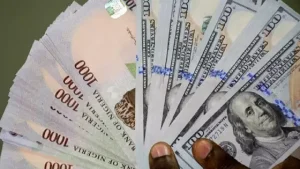Naira Dips Slightly: Falls by 0.34% Against Dollar at Official Market

The Nigerian naira experienced a slight depreciation against the United States dollar on Friday, falling by 0.34% at the official foreign exchange market. This development comes amid ongoing volatility in Nigeria’s currency market and persistent pressure on the nation’s foreign exchange reserves.
According to data published by the FMDQ Securities Exchange, which oversees the official foreign exchange trading platform, the naira closed at ₦1,419.11 to the dollar on May 3, compared to ₦1,414.86 recorded the previous day. The modest decline reflects continued demand for foreign currency driven by importation needs, repatriation of profits by multinational firms, and speculative trading activities.
The fluctuation in the naira-dollar exchange rate comes just days after the Central Bank of Nigeria (CBN) announced renewed efforts to stabilize the local currency, including continued interventions in the forex market and tighter regulation of parallel market activities. However, market analysts have noted that the persistent mismatch between demand and supply in the foreign exchange market continues to undermine the naira’s stability.
“The 0.34% depreciation is relatively mild, but it is indicative of deeper structural issues,” said Adewale Ogunleye, an economist at Alpha Finance. “We are seeing steady downward pressure due to insufficient dollar inflows, limited oil revenues, and investor uncertainty. Until these fundamental issues are addressed, the naira will remain vulnerable.”
At the parallel market — often considered a more realistic reflection of forex demand — the naira traded at around ₦1,440 to the dollar on Friday, widening the gap between the official and street rates. Despite recent raids on unlicensed forex dealers and promises of reforms, the disparity remains a challenge for businesses and individuals who rely on the black market due to difficulties accessing dollars through official channels.
The Central Bank, under the leadership of Governor Olayemi Cardoso, has been under increasing pressure to restore confidence in the naira. In recent months, the CBN has made several policy shifts, including clearing a backlog of forex forward obligations, relaxing controls on capital repatriation, and promising a more transparent forex regime. Despite these moves, investor sentiment remains cautious.
“There has been some progress on policy clarity and engagement with the private sector,” said Temi Adebayo, a financial analyst based in Lagos. “However, the macroeconomic fundamentals — inflation, interest rates, oil production levels — are still not supporting currency strength. Investors want more stability and predictability before committing long-term capital.”
Nigeria’s foreign reserves, which serve as a buffer to defend the naira, stood at $32.2 billion as of the end of April, down from $34 billion in February. While still within a manageable range, the decline signals the ongoing challenge the CBN faces in defending the naira without exhausting vital reserves.
As Nigeria navigates economic reforms and seeks to attract foreign investment, the health of its currency remains a crucial indicator of broader market confidence. Policymakers will need to act swiftly and decisively to address supply-side constraints and reassure both domestic and international stakeholders.

